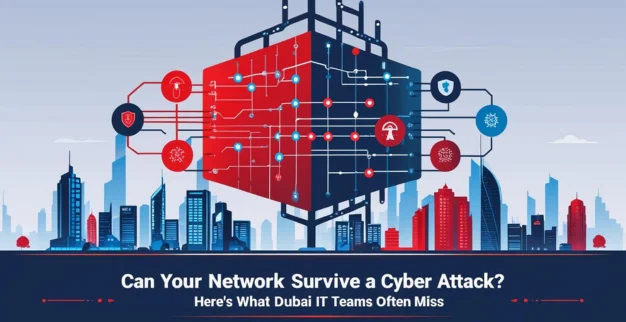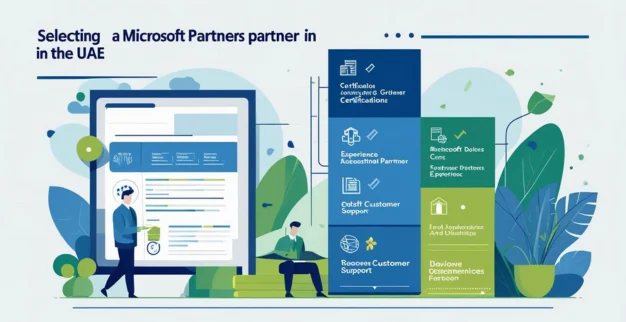Can Your Network Survive a Cyber Attack? Here's What Dubai IT Teams Often Miss
By: Ganesan D
26 July 2025
Category: Network Security
In today’s hyper-connected digital world, cyber threats are evolving faster than most organizations can respond. Dubai, with its rapid embrace of digital transformation and smart city infrastructure, stands at the forefront of innovation—but that also makes it a prime target for cyber attacks. While many IT teams in Dubai are investing in cutting-edge technology, a surprising number still overlook foundational security practices that could make or break their network defense.
The Problem: Poorly Configured Networks Invite Intrusions
A common issue across many Dubai-based enterprises—particularly small to mid-sized businesses—is poorly configured networks. These networks often lack basic safeguards such as proper firewall rules, access controls, and patch management protocols. Even well-funded companies may inadvertently expose sensitive systems due to misconfigured routers, outdated software, or weak endpoint protection.
The result? Vulnerabilities that cybercriminals actively exploit, ranging from malware infections and ransomware attacks to data breaches and insider threats. According to regional cybersecurity reports, internal threats—whether intentional or accidental—are becoming just as damaging as external intrusions. In many cases, IT infrastructure has grown too complex or outpaced the security team’s ability to manage it effectively.
Common Security Oversights in Dubai IT Teams
Despite increasing awareness, several critical areas are frequently missed by IT teams in the UAE:
- Employee Training: Humans remain the weakest link. Without regular cybersecurity awareness training, even a single click on a phishing email can compromise the entire network.
- Outdated Systems: Many organizations delay critical updates, leaving systems exposed to known vulnerabilities.
- Third-party Risks: Vendors and partners often have access to internal systems. Without strict access control, these external connections pose a serious risk.
- Mobile & Remote Work Vulnerabilities: The shift to remote work, especially post-COVID, introduced new challenges in cloud security and mobile device management that many are still catching up with.
- Lack of an Incident Response Plan: When an attack does occur, many teams scramble due to the absence of a structured incident response strategy. Time lost equals data lost.
- No Intrusion Monitoring or Prevention: Without systems like SIEM (Security Information and Event Management) or Intrusion Prevention Systems (IPS), attacks often go unnoticed until damage is done.
The Dubai-Specific Threat Landscape
Dubai’s status as a global business hub and leader in smart city technology makes its IT systems particularly attractive to hackers. Compliance frameworks like NESA (National Electronic Security Authority) and initiatives from the Dubai Digital Authority (DDA) aim to strengthen the city's cybersecurity posture. However, these standards are only effective if properly implemented.
Moreover, industries such as finance, healthcare, logistics, and government are increasingly targeted by attackers leveraging region-specific malware or social engineering tactics tailored to Arabic-speaking users. It's no longer a matter of if an attack will happen—but when.
The Solution: AGAN Secures Your Network from the Ground Up
To defend against sophisticated and evolving threats, organizations need more than basic antivirus software or off-the-shelf solutions. This is where AGAN comes in.
AGAN offers advanced network design, firewall setup, and intrusion monitoring services tailored specifically for the needs of Dubai-based businesses. By taking a holistic approach to security, AGAN ensures every layer of your IT environment is covered—from cloud to endpoint.
Key Solutions AGAN Provides:
- Network Architecture Optimization: AGAN designs scalable, secure, and resilient networks built to withstand modern cyber threats.
- Firewall Configuration & Deployment: Properly configured firewalls act as the first line of defense. AGAN ensures firewall rules align with business workflows while eliminating unnecessary exposure.
- 24/7 Intrusion Monitoring: Using real-time threat detection and SIEM systems, AGAN can identify and stop unauthorized access before it becomes a crisis.
- Compliance Readiness: AGAN ensures your IT infrastructure meets UAE compliance standards such as NESA, DDA, and industry-specific cybersecurity regulations.
- Zero Trust Implementation: AGAN helps organizations adopt a Zero Trust model, which minimizes internal threats by verifying every access attempt—whether inside or outside the network.
Conclusion: Resilience Starts with Visibility and Action
Dubai is leading the charge into the future—but without robust cybersecurity practices, even the most innovative initiatives remain at risk. The good news? You don’t have to tackle this alone. Partnering with experts like AGAN gives your organization the strategic defense needed to not just survive—but thrive—in today’s threat-filled digital world.


